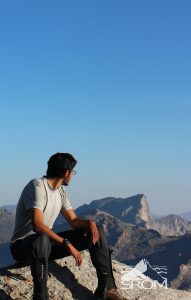By: Emily Hall
Solos are a strategic and often memorable component of a SROM course. A ‘solo’ refers to intentional time spent apart from the group in solitude. A solo is important for many reasons: reflection, prayer, time to spend in the Word, an opportunity to hear God’s voice, challenge, rest, further removal from distractions, an important ‘pause’ in the experiential education cycle—just to name a few! A solo is a time when students can withdraw to the wilderness to individually seek the Lord. Some students look forward to the time while others are quite nervous. Regardless, the solo is a valuable time of solitude, and often becomes a highlight of the course.
Among others, God led Elijah and Jesus into the wilderness for a solo experience, and it was in this place that God spoke and ministered to them (Matthew 4:1-11; Luke 4:1-13; 1 Kings 19:1-18). Both Elijah and Jesus suffered and endured emotional, mental, physical, and spiritual hardship during their solo experience. Elijah was fleeing for his life, alone, and despondent. However, the result of Elijah’s time in the wilderness was a supernatural encounter with God, physical nourishment, direction and calling for Elijah’s next steps, and comfort that the Father had reserved some of Israel to worship him (Elijah wasn’t alone in His faithfulness to God). Jesus was hungry and tempted by Satan– talk about hardship! However, at the end of His time, Luke says that Jesus “returned in the power of the Spirit to Galilee” (Luke 4:14). Enduring this hardship equipped Jesus to begin His public ministry.
Expectations vs. Reality
Everyone’s solo experience will be different. Often our students expect to bask in the beauty of creation, experiencing intimacy with the Father, truth revealed, transforming prayer time, and revelation during their solo. All of these things can and do happen. However, it is also not uncommon for the reality of the experience to be hunger, bugs, sleeplessness, restlessness, frustration, and/or fear. These sufferings are not new! Christ can relate to our suffering, and the Father works in us through the solo experience regardless of what it looked like. Physical discomfort can be a freeing and empowering experience when we lean on the Father and trust Him to teach us. Coming to the end of ourselves gives Abba more room to work!
Isolation vs Community
Christian life is lived in the world, but not of the world. Though it might be a temptation to seek to live life in solitude, we clearly see that Jesus did not live an isolated life. He had moments of isolation, but He lived in community and in ministry. Just as students must end their solo time and return to the group, they must also end their SROM course and return to daily life and their permanent communities. The solo time is meant to bolster a person in preparation for living in and transforming the world for the Kingdom.
How can you incorporate a solo time in your rhythms of life?


